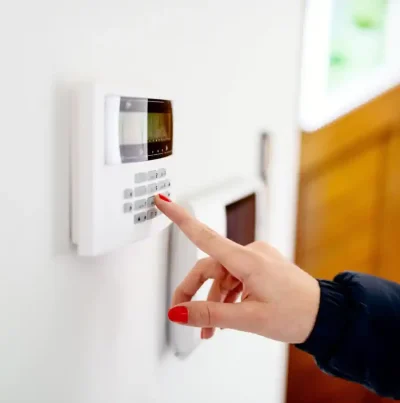Home burglar alarms are designed to deter intruders and alert you to potential break-ins. In this article, we’ll walk you through everything you need to know including the different types, their features, installation processes, and maintenance requirements. By the end, you’ll have a clear picture of whether a burglar alarm is the right choice for your home.
Types of Burglar Alarms
There are a few main types of burglar alarms to choose from:
- Wired Alarms: These are connected directly to your home’s electricity. They’re reliable but can be difficult to install on your own.
- Wireless Alarms: These use batteries and radio signals. They’re easier to set up and move around.
- Monitored Systems: A security company keeps an eye on these alarms for you.
- Bells-only Alarms: These will alert you when triggered, but you won’t have assistance included.
What’s in a Burglar Alarm System?
Every burglar alarm system has a few key parts:
- Control Panel
- Sensors
- Motion Detectors
- Sirens
- Keypad
- Backup Battery
How Do Burglar Alarms Work?
Burglar alarms are clever systems designed to detect unauthorised entry into your home. They work by using a network of sensors placed strategically around your property. These sensors can detect movement, the opening of doors or windows, or even the breaking of glass.
When your alarm system is armed and a sensor is triggered, it sends a signal to the control panel. The control panel then activates the alarm, which typically includes a loud siren to alert you and your neighbors. Some advanced systems can also send notifications to your smartphone or alert a professional monitoring service.
The key areas to place sensors include:
- Near entry points like front and back doors
- Around windows, especially ground-floor ones
- In hallways or staircases
- Near valuable items or important rooms
Are Burglar Alarms Effective?
While they’re not a foolproof solution, they can certainly play a significant role in deterring burglars. Think about it from a burglar’s perspective – if faced with two similar houses, one with a visible alarm system and one without, which would they likely choose? Most would opt for the easier target.
However, it’s important to note that alarms work best as part of a comprehensive security strategy. Combining your alarm with other measures like good quality locks, security lighting, and even CCTV can significantly boost your home’s security.
Some key points to consider:
- Visible alarm boxes can act as a deterrent
- Monitored alarms that alert a security center can provide extra peace of mind
- Smart alarms that notify your phone allow you to react quickly to any alerts
Choosing the Right System for You
When choosing an alarm system, think about:
- How big your home is
- Your budget
- What features are most important to you
- Whether you want to install it yourself or have a pro do it
It’s also a good idea to check if your area has any rules about alarm systems. Some local councils in the UK have specific requirements, especially for external alarm boxes.
Taking Care of Your Alarm
To keep your alarm working well:
- Test it every month
- Change the batteries when needed
- Clean the sensors and cameras
- Update the system when new software is available
- Have a professional check it once a year
Costs and Legal Considerations
The price of an alarm system can vary a lot. A basic do-it-yourself system might cost a few hundred pounds, while a professional setup could cost more.
In the UK, you don’t usually need a permit for a home alarm system. However, it’s worth checking with your local council about any regulations, especially regarding noise levels and duration of alarms.
Having an alarm doesn’t just protect your home – it helps you feel safe, knowing your home is secure, especially when you’re away or sleeping.
A good burglar alarm is a great way to protect your home and family in the UK. By understanding the different types, features, and what goes into setting them up, you can choose the best system for your needs. Remember, home security is an ongoing thing. Keep your system up-to-date and always put your family’s safety first. With the right alarm in place, you can rest easy knowing you’ve taken a big step in keeping your home safe.
If you’re looking to secure your home with a burglar alarm, we’re here to help. Contact Panther Security for a free, no-obligation quote and take the first step towards a safer home.
Frequently Asked Questions
- Do I need planning permission to install a burglar alarm?
Generally, you don’t need planning permission for a standard burglar alarm. However, if you live in a listed building or a conservation area, it’s best to check with your local council first. - Will my pets set off the alarm?
Many modern systems have “pet-friendly” sensors that ignore animals up to a certain weight. If you have pets, make sure to mention this when choosing a system. - Can I get a discount on my home insurance with a burglar alarm?
Yes, many UK insurance companies offer discounts for homes with security systems, especially monitored ones. The discount can vary, but it’s often between 5% and 20%. - What’s the difference between a bells-only and a monitored alarm system? A bells-only system simply makes a loud noise when triggered. A monitored system alerts a security company, who can then contact you or the police if necessary.
- Are wireless alarm systems as reliable as wired ones? Modern wireless systems are generally very reliable. They’re less vulnerable to power cuts and can’t be disabled by cutting wires. However, they do require regular battery changes.

